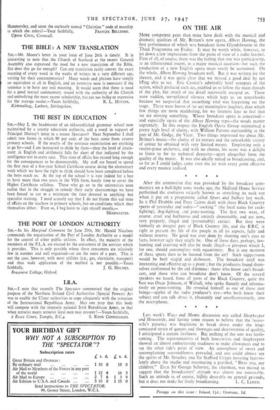MORE competent pens than mine have dealt with the musical
and dramatic qualities of Mr. Britten's new opera, Albert Herring, the first performance of which WPS broadcast from Glyndebourne in the Third Programme on Friday. It may be worth while, however, to jot down a few impressions from the point of view of a radio listener. First of all, of course, there was the feeling that one was participating, to an infinitesimal extent, in a major musical occasion—for such the production of a new English opera must surely be accounted. On the whole, Albert Herring broadcast well. But it was written for the theatre, and it was quite clear that we missed a good deal by not being able to see. Eric Crozier's admirably brief synopses of the action, which prefaced each act, enabled us to follow the main threads of the plot, but much of the detail necessarily escaped us. There were sudden, unexplained silences which kept us on tenterhooks because we suspected that something vital was happening on the stage. Thzre were bursts of (to us) meaningless laughter, than which few things are more maddening, for we listeners hate to feel that we are missing something. Where broadcast opera is concerned— and especially opera of the Albert Herring type—the words matter supremely. In this respect the English Opera Group maintained a pretty high level of clarity, with William Parsons outstanding in the part of Mr. Gedge, the Vicar. Two things impressed me about Mr. Britten's music—the clarity of its texture and the remarkable variety of colour he obtained with very limited means. Employing only a twelve-piece orchestra, and with no chorus, his score was a delight to listen to for its technical dexterity—apart altogether from the quality of the music. It was also ideally suited to broadcasting, and, so far as I could judge, came over the air with every point effective and every nuance realised.
After the commotion that was provoked by the broadcast com- mentary on a bull-fight some weeks ago, the Midland Home Service performed the evolution vulgarly known as stretching its neck out when it put on a programme called Spurs and Sulkies last week. In it Phil Drabble and Peter Cairns dealt with three Black Country sports of yesterday and today—" cocking" (the local name for cock- fighting), dog-fighting i.nd pony-trotting. The fist two were, of course, cruel and barbarous and entirely abominable, and are now,, very properly, illegal and (presumably) extinct. But they were formerly an integral part of Black Country life, and the B.B.C. is right to present the life of the people in all its aspects, fully and without reserve. No good was ever done by shutting one's eyes to facts, however ugly they might be. One of these days, perhaps, fox- hunting and coursing will also be made illegal—a prospect which I, for one, should contemplate with equanimity. But is any mention' of these sports then to be banned from the air? Such suppression would be both stupid and dishonest. The broadcast itself was interesting and effective up to a point ; but the producers found them- selves confronted by the old dilemma: those who know can't broad- cast, and those who can broadcast don't know. Of the several speakers we heard, from all parts of the Black Country, quite the test was Oscar Johnson, of Walsall, who spoke fluently and informa- tively on pony-trotting. He revealed himself as one of those rare beings—apples of the radio producer's eye—who both know their subject and can talk abaut it, pleasantly and unselfconsciously, into the microphone.
Last week's Ways and Means discussion was called Shopkeeper and Housewife, and having some reason to believe that the house- wife's patience was beginning to break down under the long- continued strain of queues and shortages and deterioration of quality, I anticipated a certain liveliness. But nothing of the sort was forth- coming. The representatives of both housewives and shopkeepers showed an almost embarrassing readiness to make allowances and to see the other side's point of view. An atmosphere of sweet and uncomplaining reasonableness prevailed, and one could almost see the spirits of Mr. Strachey anc Sir Stafford Cripps hovering benevo- lently above the studio and murmuring a gratified, "Bless you, my children." Even Sir George Schuster, the chairman, was moved to suggest that the broadcasters' attitude was almost too reasonable. Such an attitude is, of course, hibly desirable on general grounds,
but it does not make for lively broadcasting. L. C. LLOYD.


































 Previous page
Previous page